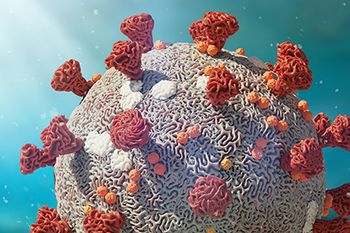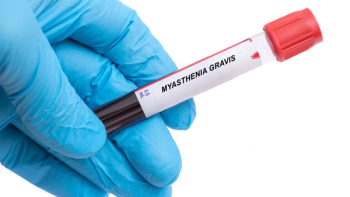
R&D/Clinical Trials
Latest News
Latest Videos

More News

Neha Anand, Analyst, Biopharma Intelligence Services, Citeline, explains how the approval of Emrelis marks a pivotal moment for ADC therapies in oncology, reflecting the FDA’s growing confidence in their safety and efficacy and accelerating the shift toward precision medicine in cancer treatment.

The MC4R agonist targets rare genetic and hypothalamic obesity, with potential as a combination or maintenance therapy for general obesity alongside GLP-1 agents.

Neha Anand, Analyst, Biopharma Intelligence Services, Citeline, discusses how Emrelis fits into the current antibody-drug conjugate landscape and what distinguishes its approach in biomarker-driven oncology.

Corina Dutcus, SVP, oncology global clinical development lead at Eisai, discusses the potential of the E7386 and lenvatinib combination to address unmet needs in second-line treatment for endometrial carcinoma patients.

Corina Dutcus, SVP, oncology global clinical development lead, Eisai, explains how E7386 and lenvatinib work together to target advanced endometrial carcinoma through dual mechanisms of action and WNT pathway modulation.

Corina Dutcus, SVP, oncology global clinical development lead, Eisai, highlights how long-term LEAP-002 data provides critical reassurance around Lenvima’s durability and safety in treating unresectable hepatocellular carcinoma.

Preclinical study shows oral PL7737 agonist outperforms tirzepatide alone in rodent models, supporting Palatin’s plans for clinical trials targeting both general and rare forms of obesity.

Corina Dutcus, SVP, oncology global clinical development lead, Eisai, highlights how consistent survival data from the LEAP-002 study reaffirms lenvatinib’s value in first-line treatment of unresectable hepatocellular carcinoma.

The new drug application is supported by 48-week data from the Phase III MK-8591A-051 and MK-8591A-052 trials, which showed that the doravirine/islatravir combination was non-inferior to both baseline antiretroviral therapy and to bictegravir/emtricitabine/tenofovir alafenamide in treating HIV.

The traditional approach to trial management relies on a mix of solutions that often become siloed and difficult to integrate.

The supplemental New Drug Application is supported by Phase III data, which showed Caplyta significantly prolonged time to relapse compared to placebo and reduced the risk of relapse by 63% in patients with schizophrenia.

The delivery method showed promise in preventing the illness.

The Phase II THULITE trial will analyze the safety and efficacy of BI 1815368, an investigational oral therapy designed to reduce fluid leakage in the retina and ease the treatment burden for patients with diabetic macular edema.

Results from the Phase III VEGA-3 trial show that a significantly higher number of patients with presbyopia who received MR-141 achieved a ≥3-line gain in binocular near visual acuity without compromising distance vision compared to placebo.

Results from the Phase III Vivacity-MG3 trial show that Imaavy provides more consistent disease control than other approved FcRn blockers in adults with generalized myasthenia gravis.

Pedro Valencia, VP, asset strategy, leadership, oncology, AbbVie, outlines how the company is accelerating development across lung, gastrointestinal, and ovarian cancers following ASCO 2025, with a focus on advancing antibody drug conjugates and expanding late-stage studies.

Results from the Phase IIIb FRONTIER5 trial demonstrated that Mim8 prophylaxis was well-tolerated when administered without a washout period or loading dose in patients with hemophilia A.

Pedro Valencia, VP, asset strategy leadership, oncology, AbbVie, explains how the company partners with patient advocacy groups to identify unmet needs and prioritize patient-centered benefits in the development of innovative cancer therapies.

Results from the Phase III BASIS trial show that once-weekly subcutaneous Hympavzi reduced annualized bleeding rates by 93% compared to on-demand treatment with bypassing agents in patients with hemophilia A or B.

Final results from the Phase IV PEARL trial show that 66% of patients treated with Ajovy for episodic migraine and more than half of those treated for chronic migraine who responded during the first six months maintained a ≥50% reduction in monthly migraine days.

Results from the Phase III SUNMO trial show that the Lunsumio and Polivy combination achieved statistically significant improvements in both progression-free survival and objective response rate in patients with relapsed or refractory large B-cell lymphoma.

The idea of denying people proven medicines in the name of research has a dark legacy in this country.

Pedro Valencia, VP, asset strategy leadership, oncology, AbbVie, explains how the company is advancing Temab-A across multiple tumor types targeting c-Met, with the goal of establishing it as a pipeline-in-a-molecule.

Early results from the Phase I/II NXTAGE trial show that NXT007 may achieve hemostatic normalization in patients with hemophilia A without factor VIII inhibitors.

Pedro Valencia, VP, asset strategy leadership, oncology, outlines how unmet need, treatment stagnation, and pipeline innovation shape the company’s approach to solid tumor oncology following key data presented at ASCO 2025.














